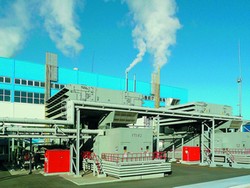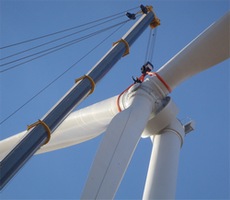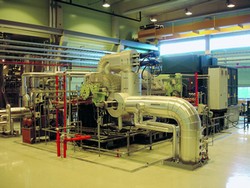The station consists of three Zvezda-GP-1100-VK-02-M3 gas engine power plants each rated at 1100 kW, stand-by diesel generating set rated at 630 kW. All power and auxiliary equipment was supplied by Zvezda-Energetika JSC. Following the tests the station was accepted for industrial operation. After commissioning the station will ensure power supply for the field.

Новости
Under the contract Avtonomny Energoservice delivered two GE Energy Jenbacher gas engines JMS 320 NL cogeneration power plants each rated at 1053 kW for the first stage of the project.
Under the second stage it is planned to increase the number of gas engine plants on the station up to six. The station also includes two stand-by diesel generating sets Gesan DVAS630E designed on the base of TAD1642GE diesel engine and Stamford HCI534E/544E electric generator. Diesel generating sets are mounted in sound-proof containers and installed in the station building.
Gas boiler-house with output of 5 MW on the base of Calortec (Finland) TKH-TVO-10 boilers operate as a part of the station.

The station consists of two GE Energy LM6000 PD Sprint each rated at 45 MW, two ÊUP-75-3.9-440 heat recovery steam generators, manufactured by Yuzhtransenergo AK and PT-25/34-3.4/1.2 steam turbine rated ate 25 MW delivered by Kaluzhsky Turbine Plant.
The station equipped with MARK VI Speedtronic control system. Enerproject EGSI-S-300/1000-100/1000 WA fuel gas treatment plant with output of 13 000 m3 per hour was delivered by Energas Ltd. The customer of the project is Kvadra JSC.
The German manufacturer PowerWind GmbH has successfully completed the commissioning of its first 2.5 MW wind turbine of the type PowerWind 90. The prototype with a rotor diameter of 90 meters was installed in Bremerhaven early December. At the beginning of 2011, the turbine will be handed over turnkey ready to the customer wpd AG. Thus, after a development period of less than three years, PowerWind will now have on offer, apart from the PowerWind 56 with 900 kW rated power already established on the market, also a turbine in the multi-megawatt range.
Due to the full-scale converters and an intelligent control system, PowerWind 90, with its excellent fault ride-through capabilities and extended reactive power control range, will meet even the most demanding grid requirements.
From 2011, an additional product version of the 2.5 MW wind turbine with a rotor diameter of 100 m will be available for moderate wind sites, which will also meet German SDL requirements.
 EWT announces a successful erection of its new EWT DW90 2MW turbine. With this innovative new design EWT will be able to offer a reliable technology at reasonable costs. Today the DW90 2MW turbine is producing its first kilowatt-hours.
EWT announces a successful erection of its new EWT DW90 2MW turbine. With this innovative new design EWT will be able to offer a reliable technology at reasonable costs. Today the DW90 2MW turbine is producing its first kilowatt-hours.
The DW90 2MW turbine has been erected at Shangdu Xinghe, Inner Mongolia, China. EWT has designed this new turbine for her joint venture partner in China, the China Acadamy of Launch Vehicle Technology (CALT) and owns the exclusive marketing rights outside China.
Due to its highly advanced Direct Drive technology the DW90 turbine requires less maintenance which will lead to lower operational costs and higher up-time. With its 90 meter rotor diameter the turbine is especially applicable to sites with wind class IIA and IIIA. The turbine has excellent maintenance characteristics due to the single main bearing concept, a new PM generator and the excellent accessibility of all parts of the turbine. In line with EWT’s innovative character it is expected to finish the design for a 3 MW Direct Drive turbine before year- end with the first prototype up and running in 2012.
The installation of the first 2MW turbine prototype is an important milestone in the history of EWT. The second prototype will be installed in Lelystad, The Netherlands. EWT’s 2MW turbine is expected to be commercially available mid 2011.
Four Motor Sich PAES-2500G each rated at 2.5 MW ensure electric power supply for the needs of Yaraktinskoye oil field (Ust-Kutneftegas JSC) in Irkutskaya Region. They operate on casing-head gas. Total output of the power complex is 10 MW. In future it can be increased up to 16 MW. General designer of the project is VNIPIgasdobycha JSC.
Power complex will ensure operation of gas pumping units with electric drive with output of 800000 m3 per day. Yaraktinskoye oil field is situated in 140 kilometers from Ust-Kuta (Irkutskaya Region).

The construction of steam turbine power station with total output of 24 MW was finished in Parnu. At present commissioning works are carried out on the site. Fortum Concern (Finland) invested to the project 80 million euro. The Customer of the project is Eesti Energia. The station was designed around Siemens SST-600 steam turbine.
The commissioning of the station is planned at the end of December 2010.
